Search Results
Showing results 21 to 40 of 84
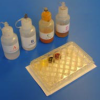
Finding Red
Source Institutions
In this chemistry challenge, learners systematically investigate which combination of four solutions produces a deep red color.
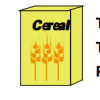
Number Sense and Computation: Food For Thought
Source Institutions
In this math lesson, learners identify and compare unit costs of given items. Learners use computation skills, problem solving and number sense to find the cost of an ounce of cereal.

Geometry and Spatial Relations: Tessellations WOW!
Source Institutions
In this math lesson, learners explore tessellations through literature, music, writing, and art activities.
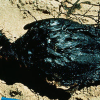
Ocean in a Bottle
Source Institutions
In this activity, learners consider how oil spills behave in the ocean and what impact they have on marine wildlife.
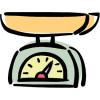
Measurement: Sand Babies
Source Institutions
In this math lesson, learners explore and investigate measurement using standard and non-standard units.
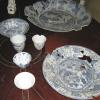
Treasures in the Rough
Source Institutions
In this archaeology activity, learners make observations and conduct an experiment to demonstrate the effect saltwater has on artifacts.

Dip Dip, Hooray
Source Institutions
Lakes, streams and other freshwater bodies are a habitat for lots of living things, big and small.
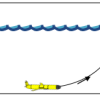
Exploring the Ocean with Robots
Source Institutions
In this activity, learners are introduced to robotic submarines called gliders. Learners make “gliders” from plastic syringes and compare these to Cartesian bottles and plastic bubbles.
What Molecules Make the Holes in Bread?
Source Institutions
In this activity, learners will discover why there are holes in bread.
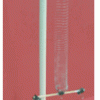
Wilberforce Pendulum
Source Institutions
In this activity, learners build a Wilberforce Pendulum, a special coupled pendulum in which energy is transferred between two modes of vibration, longitudinal ("bounce') and torsional ("twist"), on a
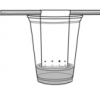
Busted by Biology
Source Institutions
In this two-part activity, learners will extract their own DNA from their cheek cells and learn how DNA is analyzed and used to solve crimes.
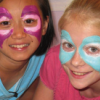
Structure of Matter: Pigment vs. Iridescence
Source Institutions
This is an activity (located on page 3 of the PDF under Butterfly Wings Activity) about how visible light is affected by tiny nanoscale structures, producing iridescence on butterfly wings, soap bubbl
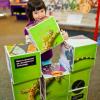
Build a Giant Puzzle!
Source Institutions
In this activity, learners assemble large cubes to make nano-related images. Learners discover how different objects are related to nanoscience and nanotechnology.
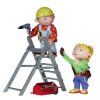
Building Together
Source Institutions
In this Bob the Builder(TM)-themed activity, learners explore what it means to work together as a team.
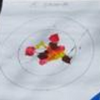
Moon's Long History: Impact Paintings
Source Institutions
In this activity, pairs of learners model how scientists use craters to determine the ages of lunar surfaces. One partner keeps time while the other creates a painting for the other to interpret.
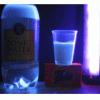
Glow Up
Source Institutions
In this activity, learners explore chemiluminescence and fluorescence. Learners examine 3 different solutions in regular light, in the dark with added bleach solution, and under a black light.
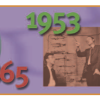
Biotechnology Through Time
Source Institutions
In this activity, learners investigate the history and development of agricultural biotechnology.
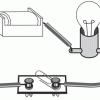
Control the Flow
Source Institutions
In this activity about electricity, learners build and test a paper clip switch to turn on a light bulb.
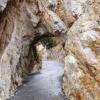
Weathering and Erosion
Source Institutions
In this activity (page 13 of the PDF), learners discover how weathering and erosion change the Earth’s surface.
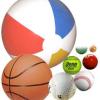
Size, Mass, Area, and Volume
Source Institutions
In this activity (page 23 of PDF), learners conduct an experiment to determine how the size and mass of a projectile affects the area and the volume of an impact crater.
